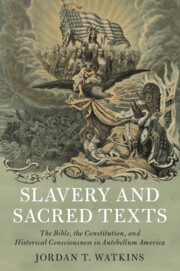 Slavery and Sacred Texts
Slavery and Sacred Texts Book contents
- Slavery and Sacred Texts
- Cambridge Historical Studies in American Law and Society
- Slavery and Sacred Texts
- Copyright page
- Dedication
- Contents
- Acknowledgments
- Prologue
- Introduction
- 1 “Recourse Must Be Had to the History of Those Times”
- 2 “The Ground Will Shake”
- 3 “Texts … Designed for Local and Temporary Use”
- 4 “The Further We Recede from the Birth of the Constitution”
- 5 “The Culture of Cotton Has Healed Its Deadly Wound”
- 6 “Times Now Are Not as They Were”
- 7 “We Have to Do Not … with the Past, but the Living Present”
- 8 A “Modern Crispus Attucks”
- Conclusion
- Epilogue
- Index
1 - “Recourse Must Be Had to the History of Those Times”
Published online by Cambridge University Press: 12 June 2021
- Slavery and Sacred Texts
- Cambridge Historical Studies in American Law and Society
- Slavery and Sacred Texts
- Copyright page
- Dedication
- Contents
- Acknowledgments
- Prologue
- Introduction
- 1 “Recourse Must Be Had to the History of Those Times”
- 2 “The Ground Will Shake”
- 3 “Texts … Designed for Local and Temporary Use”
- 4 “The Further We Recede from the Birth of the Constitution”
- 5 “The Culture of Cotton Has Healed Its Deadly Wound”
- 6 “Times Now Are Not as They Were”
- 7 “We Have to Do Not … with the Past, but the Living Present”
- 8 A “Modern Crispus Attucks”
- Conclusion
- Epilogue
- Index
Summary
This chapter shows that thinkers across the antebellum religious spectrum, from Charles Hodge’s orthodox Calvinism to Andrews Norton’s liberal Unitarianism, accepted history as the favored battleground in debates about canon and religious truth. These developments had colonial roots, but flowered in the nineteenth century. Although America’s antebellum biblical scholars responded differently to developments in German biblical criticism, those developments led them to defend their canonical choices with historical arguments, base their hermeneutics in historical analysis, and center their epistemologies in historical knowledge. Even those who rejected aspects of historical interpretation nonetheless recognized the need to address historical readings. Whether in using historical readings or in dismissing them as dangerous or problematic, American biblical interpreters’ efforts highlighted crucial contextual differences between their world and the biblical pasts they looked to for guidance. In short, the stress on historical difference in biblical interpretation introduced a sense of historical distance, which carried with it the threat of questioning the Bible’s relevance.
Keywords
- Type
- Chapter
- Information
- Slavery and Sacred TextsThe Bible, the Constitution, and Historical Consciousness in Antebellum America, pp. 28 - 68Publisher: Cambridge University PressPrint publication year: 2021


